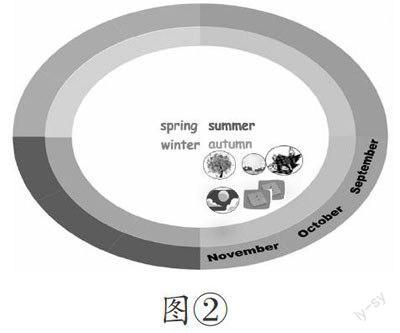让学习真正发生,教师可以做些什么?
2017-05-30钱希洁
钱希洁


【摘要】所谓“教学”,顾名思义,就是通过教师的“教”引导学生的“学”,其落脚点在“学”,因此,教师“教”的价值一般通过学生的“学”才能得到真正体现。无论教师教得如何,如若不能引发学生真正的学习活动以及相应学习能力的提升,那么,所谓的教学活动都失去了存在的意义,唯有真正引发学生内部发生的学习活动才是真正意义上的学习。因此,“让学习真正发生”成了当今英语课堂教学改革的必然与应然。
【关键词】教学 唤醒 容错 引导 放手
本文主要结合译林版小学《英语》五下Unit 7 Chinese Festival 中Grammar time 和Fun time板块教学中的几个片段,阐述如何通过唤醒、容错、引导和放手等四个方面引导学生开展真正意义上的学习活动,从而从传统意义上的“教”向学生的“学”转变,实现“让学习真正发生”的教育愿景。
一、唤醒:让学习在运用旧知中启动
德国教育家福禄贝尔曾经说过:“教学的使命与其说是把知识注入到人的心灵内部,毋宁说把更多的东西从心灵内部焕发出来。”因此,在英语课堂教学中,真正的学习不仅在于向学生传授英语语言知识,更在于唤醒他们内部与教学内容有关的知识和经验,并使他们在回顾旧知、运用旧知进行表达的过程中启动思维,进入新知的学习。
译林版小学《英语》五下Unit 7 Chinese Festival 中Grammar time和Fun time板块在Story time板块学习的基础上,仍以单元话题Chinese Festival为中心,进一步学习表示月份的英语词汇及其缩写形式,并运用所学语言根据不同季节的特点开展语言交流活动。在前面一个课时的教学活动中,学生对故事文本中提及的The Spring Festival, The Dragon Boat Festival, The Mid-Autumn Festival和 The Double Ninth Festival等几个中国传统节日有了初步的理解,因此,在本课时的教学活动中,笔者依然从单元话题Chinese Festival出发,结合学生在前一课时中已经学过的四个中国传统节日,引导学生通过“向外国友人介绍中国节日”的方式,唤醒学生对于单元话题Chinese Festival更多的知识和生活经验,从而促使学生启动思维,为学习的真正发生做好准备。教学片断如下:
笔者用PPT呈现四个表示节日的画面。
T: Please look at the pictures. What festivals do you know?
Ss: Yes. Theyre ....
T: What is the most important festival in China?
S1: I think it is the Spring Festival.
T: Yeah. I think so. But when is the Spring Festival?
教师板书新句型The Spring Festival is in ... or ...
S2: It is in January, February.
T: So we can say the Spring Festival is in January or February.
T: I have some friends in UK. They want to know more about Chinese festivals. Would you like to introduce these Chinese festivals to them? Ill take some videos for them. You may choose one you like.
S3: I want to introduce the Dragon Boat Festival.
T: OK. Please.
S3: The Dragon Boat Festival is in May or June. There are Dragon Boat races in some places. We usually eat rice dumplings at the festival. I like the festival, because I can have a holiday.
T: Thats good. Thank you.
用同樣的方式,笔者请其他两位学生介绍The Mid-Autumn Festival和 The Double Ninth Festival两个中国节日,让学生在复习前一课时学过的语言知识的过程中复现了旧知,并在运用旧知开展文化传承的过程中启动了思维,为他们在相关的主题学习活动中发生真正的学习打好基础。
二、容错:让学习在自我纠错中发生
对于学生而言,新的语言知识往往在学生已有的语言知识体系之外,从程度上来说,它们高于学生已有的语言知识层面。因此,在英语课堂教学中,若是让学生自主学习新的语言知识,学生难免会出现这样或那样的差错。在很多老师的观念中,学生出差错就是教学质量的低下。也因此,在英语课堂教学中,我们很多老师宁愿采用各种直接“告知”的方式,让学生直接接受新的语言知识,也不愿意让学生自己去探索新的语言知识。确实,这种方式在一定程度上可以避免或者降低学生在课堂上的差错,然而,因为教师对知识的呈现不是基于学生的知识层面,学生缺失了对相关知识形成过程的关注,他们很容易仅仅局限在这个知识的接受层面,思考过程的缺乏使他们错过了一个个通过思考自主获得知识的机会,长此以往,学生的思考力必然难以得到较好发展,他们在今天课堂上暂时的低差错必然导致今后语言运用过程中的高差错。反之,若是我们能够看到这些差错所隐含的发展价值,多一份“容错”的意识,引导学生根据这些差错,通过观察、思考等方式去找寻正确的答案,让学生在自我发现的学习活动中获得新的语言知识,并在经历从错误到正确的思考过程中,催生自身思考力的发展,使学习真正发生。
笔者在教学本课关于月份名称缩写形式的时候,不是将十二个月份的英语缩写形式直接呈现给学生,而是在运用台历呈现两个缩写形式的基础上,让学生自己去发现,在他们出现差错的时候,引导他们通过观察、比较和思考找到正确答案,教学片断如下:
T: Now we know there are twelve months in a year. But sometimes we can see the names of the months like this:
笔者用PPT 呈现有着月份缩写形式的日历,如图①:
图①
T: Do you know what “Jan.” here means?
Ss: It means January.
T: Yeah. Here “J-a-n-” is the short form of “January”. So what does “F-e-b-” mean ?
Ss: I think it means February.
T: Thats good. Well,Please write down the short forms of the other months?
Ss: OK.
学生在作业纸上写出其他十个月份名称的缩写形式。
T: Now lets check the answers. You may say like this: J-a-n- January.
S1: M-a-r- March.
S2: A-p-r- April.
S3: M-a-y- May.
T: Attention please!Is there a dot here?
Ss: No.
T: Look at the short form of May carefully. Whats the difference between the short form of May and April?
S4: There is no dot in May.
T: Yes. Youre right. The short form of May is special. Theres no dot here. Lets try to say: May, May, no dot.
Ss: May, May, no dot in May.
T: Well, lets go on.
S5: S-e-p- September.
T: Attention please!Look at the short form of September carefully. How many letters here?
S5: There are four.
T: So whats the short form of September?
S5: S-e-p-t- September.
T: Yes, the word is special too. Lets try to remember it.
記得著名诗人泰戈尔在他的《飞鸟集》中有这么一句话:“当乌云被阳光亲吻时,它们就变成了天空中的花朵。”假如我们把学生的差错看作是课堂上空的片片乌云,那么,当我们能以阳光的心态来关照这些差错所蕴含的发展价值,并引导学生在观察、比较和思考中找到正确答案的时候,那些暂时的差错就变成了课堂上一朵朵美丽的花朵。
三、引导:让学习在积极尝试中继续
捷克著名教育家夸美纽斯曾经在他的《大教学论》中指出:“种子如果种在地上,它便会向下生出根芽,向上长出嫩芽,嫩枝凭着他们天生的力量,日后便可长成枝干和树叶,垂着绿荫,点缀着花儿与果实。”可见,教学的关键在于积极引导学生学会学习,并逐步实现自我发展。就英语课堂教学而言,有些语言知识需要教师的传授,但更需要在教师的引导下,让学生在积极的尝试中去发现。
因此,在本课时的教学活动中,面对一些表示月份的新单词的教学,笔者放弃了原本通过创设教学情境直接教学词汇的传统方法,而是将这些表示月份的新单词融入到了本单元的主题“Chinese Festival”之中,并引导学生根据这些单词的读音规则,积极尝试,学会朗读这些新的词汇,教学片断如下:
T: Here I have another video about Chinese festivals. Lets watch it and find out more about Chinese festivals.
笔者播放关于中国节日的视频文件,并定格在最后画面,画面上有一些中国的节日,如腊八节、七夕节等。
T: Look! So many festivals here! What other festivals can you see?
S1: I can see La Ba Festival.
T: Whens the festival? Do you know? Maybe its very cold.
S2: Its in ....
T: Look at the word. There are three syllables in the word. Theyre “de”, “cem” and “ber”. Can you try to read the word?
Ss: December.
T: Thats good. You can read the word by yourselves. So we can say: La Ba Festival is in December.
T: From last period, you know the Double Ninth Festival. It is on the ninth day of September. But do you know Double Seventh Festival?
Ss: Yes.
T: When is the festival?
S3: I think its in the seventh month of the year.
T: Yeah. Youre quite right. What month is the seventh month? Can you read the word July? Just try.
S4: July.
T: But sometimes the Double Seventh Festival is in the next month. Can you try to read the word?
Ss: August.
T: Thats good. When is the Double Seventh Festival?
Ss: The Double Seventh Festival is in July or August.
T: Thats right. Look at the picture please. Is it romantic?
Ss: Yes.
T: Do you like it ?
Ss: Yes.
T: Is it your festival?
Ss: Yes.
T: Really?
Ss: No.
學生大笑。
T: Why are you laughing?
Ss: Its not our festival.
T: Now please look at the blackboard. How many months can you see here?
Ss: There are eleven months.
T: Are there eleven months in a year?
Ss: No. There are twelve months in a year.
T: So whats missing? Look! What is it? Here “ar”is pronounced /a:/. Can you try to read the word?
Ss: March.
T: Well done.
很多时候,我们总是抱怨我们的学生不会学习,抱怨他们总是记不住老师反复传授的知识。其实,很多时候,不是我们的学生缺乏学习的能力,而是我们教师剥夺了本该属于学生自主学习的权利,使学生的学习能力难以得到较好发展;学生总是记不住老师传授的知识,也不是学生的问题,而是我们教师的问题,假如我们常常能够对学生的学习能力多一份信任,对学生在学习过程中暂时出现的差错多一份包容,并耐心引导学生根据已有的知识经验去探索未知的知识,让他们在真正的学习活动中发展学习能力,如是,所谓的学习才具有真正的意义。
四、放手:让学习在实践语言中延伸
中国著名教育家叶圣陶先生曾经说过:“教材无非是个例子。”因此,就英语课堂教学而言,仅仅引导学生学会教材所呈现的语言还远远不够。我们还应该以教材上学习的语言知识为基础,进一步创设新的语境,引导他们积极参加更为丰富的语言实践活动,让学习在他们生成更为丰富的语言过程中得以延伸。
因此,在本次英语课堂教学活动中,笔者在学生学习相关语言知识的基础上,让学生选择自己喜欢的季节开展语言实践活动,促使真正的学习在实践语言的过程中延伸。教学片断如下:
T: Now we know there are twelve months in a year. But how many seasons are there in a year?
Ss: There are four seasons in a year.
T: What are they?
Ss: Theyre spring, summer, autumn and winter.
T: Which is the first season of the year?
S1: Spring.
T: Does it begin from January?
S2: No.
T: Then when does it begin?
S3: March.
T: So spring is in March, April and May. What about autumn, summer and winter?
引导学生用句型“... is in ...”来描述一年中不同的季节分别所处的月份,从而将十二个月份的英语名称和四个季节融合在一起。
T: Which season do you like best? Why?
S4: I like summer. Because it is hot in summer. I can go swimming and eat a lot of ice-cream.
T: Yeah, I see. But dont eat too much ice-cream.
T: What season do I like? Can you guess?
S5: I think Miss Qian likes spring. Because I think she likes flowers. And in spring we can see a lot of flowers.
T: Thank you. I really like flowers. But I like autumn best. First, my birthday is in autumn. Autumn is in September, October and November. In autumn, its cool. We can see yellow trees. We have picnics. The Mid-Autumn Festival is in autumn. We get together with our families. We look at the moon and eat moon cakes together. We have a lot of fun in autumn.
教師边说边把体现秋季特色的图片贴在板书上,如图②,然后让学生选择自己喜欢的季节制作一张季节卡,并用英语进行介绍。
T: Would you like to make a season card like this?
Ss: Yeah!
T:OK. But attention:
1. Choose the season you like and write down the months and the season.
2. Add or draw some pictures in the right season.
3. Try to introduce your season card in English.
假如说词汇的学习为学生语言能力的发展提供了基本的素材,相关的语法知识又为学生准确的表达提供了基本的保证,那么,相关语言实践活动的及时跟进则为他们语言能力的实质性发展提供了必要的锤炼。从季节卡的制作到季节卡的描述,使学生自然将所学的相关知识融合在一起,这一活动便具有了真实的意义。自主选择则给这项语言实践活动赋予了一份人文的意蕴,当真实意义与人文意蕴同时向学生走来,真正的学习活动便不可避免地发生了。
